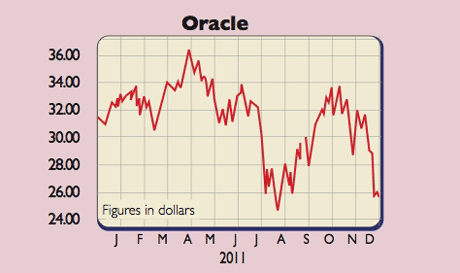Get the latest financial news, insights and expert analysis from our award-winning MoneyWeek team, to help you understand what really matters when it comes to your finances.
You are now subscribed
Your newsletter sign-up was successful
Want to add more newsletters?

Twice daily
MoneyWeek
Get the latest financial news, insights and expert analysis from our award-winning MoneyWeek team, to help you understand what really matters when it comes to your finances.

Four times a week
Look After My Bills
Sign up to our free money-saving newsletter, filled with the latest news and expert advice to help you find the best tips and deals for managing your bills. Start saving today!
Twitter generates 90 million messages a day, Wal-mart logs one million transactions per hour, and Facebook stores 30 billion bits of content on its website. Welcome to 'Big Data', the capacity to collect, decipher and analyse Himalayan quantities of information at the touch of button. Used correctly, Big Data allows organisations to stay ahead enabling them to react immediately to upcoming trends.
That's where Oracle comes in. As the world's largest provider of database hardware and software, it has a 48.6% market share more than twice that of its arch-rivals Microsoft (17.5%) and IBM (20.9%). CEO Larry Ellison is seeing "strong" demand for its recently launched line of Exadata, Exalogic, Exalytics and SuperCluster software and servers.
Despite Ellison's confidence, the group released a mini profits warning on the Tuesday before Christmas. In reaction, the stock dropped 12% as a 2% rise in sales compared badly to the 7% expected by analysts. The gap is being attributed to customers delaying hardware purchases in light of forthcoming major technology upgrades.
MoneyWeek
Subscribe to MoneyWeek today and get your first six magazine issues absolutely FREE

Sign up to Money Morning
Don't miss the latest investment and personal finances news, market analysis, plus money-saving tips with our free twice-daily newsletter
Don't miss the latest investment and personal finances news, market analysis, plus money-saving tips with our free twice-daily newsletter
However, the firm's performance should improve quickly, with next quarter's earnings set to rise to 55 to 58 cents per share on turnover up 2%-5%. This is mainly down to the fact that more than 50% of Oracle's business lies in ongoing services and software updates. This is high-margin work and commands retention rates of 90%+, reflecting the critical nature of Oracle's core systems to its 380,000 customers. These systems do not face the same sort of disruptive technology that, for example, threatens Microsoft's Windows as personal computers go mobile.
Oracle Corp (Nasdaq: ORCL), rated a BUY by Jefferies

Wall Street is forecasting sales and underlying earnings per share (EPS) of $37.5bn and $2.35 respectively for the year ending May 2012, rising to $40bn and $2.57 a year later. So the stock trades on an attractive price/earnings (p/e) ratio of 11, and offers a 0.8% dividend yield. I rate Oracle on a ten-times EBITA multiple. Adjusting for the net cash of $16bn, that generates an intrinsic value of around $35 a share.
For patient investors, the downside looks limited. In the event of a modest pullback in IT spending, Oracle should fare much better than its rivals. That's because software is dominated by scale, meaning the largest vendors tend to create products fastest and at the lowest cost, thanks to their global footprints and huge development teams. The upshot is that if we hit a sticky patch, a tech titan such as Oracle should win business and even gobble up acquisitions on the cheap. I think last month's earnings miss was a blip. The rare occasions in which Oracle has disappointed have usually signalled buying opportunities. Investment bank Jefferies has a $36 price target.
Paul Hill also writes a weekly share-tipping newsletter, Precision Guided Investments. See www.moneyweek.com/PGI , or phone 020-7633 3634 for more.
Get the latest financial news, insights and expert analysis from our award-winning MoneyWeek team, to help you understand what really matters when it comes to your finances.
Paul gained a degree in electrical engineering and went on to qualify as a chartered management accountant. He has extensive corporate finance and investment experience and is a member of the Securities Institute.
Over the past 16 years Paul has held top-level financial management and M&A roles for blue-chip companies such as O2, GKN and Unilever. He is now director of his own capital investment and consultancy firm, PMH Capital Limited.
Paul is an expert at analysing companies in new, fast-growing markets, and is an extremely shrewd stock-picker.
-
 Should you buy an active ETF?
Should you buy an active ETF?ETFs are often mischaracterised as passive products, but they can be a convenient way to add active management to your portfolio
-
 Power up your pension before 5 April – easy ways to save before the tax year end
Power up your pension before 5 April – easy ways to save before the tax year endWith the end of the tax year looming, pension savers currently have a window to review and maximise what’s going into their retirement funds – we look at how